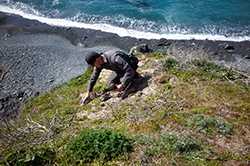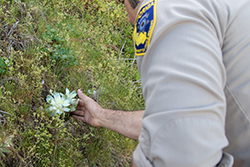Last week, a team of California Department of Fish and Wildlife (CDFW) staff and volunteers spent hours working to replant more than 2,000 Dudleya succulents that were seized after a poaching investigation. The plants were meticulously returned to the Mendocino and Humboldt county cliffs from where they were stolen weeks before.

Wildlife Officer Pat Freeling replanting dudleya.

Wildlife Officer Will Castillo replanting dudleya.
Last week, a team of California Department of Fish and Wildlife (CDFW) staff and volunteers spent hours working to replant than 2,000 Dudleya succulents that were seized after a poaching investigation. The plants were meticulously returned to the Mendocino and Humboldt county cliffs from where they were stolen weeks before.
The sheer volume of plants made it necessary to put a call out for help from volunteer botanists. The response was overwhelming. More than 20 succulent experts from the California Native Plant Society and U.C. Santa Cruz arboretum, along with National Parks Service personnel, assisted CDFW wildlife officers and seven environmental scientists on the replanting project. The replanted succulents will be monitored over the next week to ensure the greatest chance for survival.
CDFW Environmental Scientist Michael van Hattem calls Dudleya “the botanical version of abalone,” in the sense that they are a sensitive species, dependent on a very specific habitat. Without a concerted effort to reverse the effects of such a large poaching operation, he says, the ecosystem would be irreversibly damaged.
In March 2018, CDFW law enforcement officers uncovered an international conspiracy to strip the succulents from sea cliffs and ship them overseas to other countries, including Korea and China, where they are prized for decorative purposes. So far, there have been three significant poaching investigations. In the first case, prosecuted in Mendocino County, the subject was found guilty and fined $5,000. A second case is also currently pending in Mendocino County.
The  third recent case was out of Humboldt County, where wildlife officers seized well over 2,000 succulent plants from three suspects. Prosecution of that case is also pending. This week, the Humboldt County District Attorney’s Office released all but 10 of the plants from evidence to allow the team to replant them at the location where taken.
third recent case was out of Humboldt County, where wildlife officers seized well over 2,000 succulent plants from three suspects. Prosecution of that case is also pending. This week, the Humboldt County District Attorney’s Office released all but 10 of the plants from evidence to allow the team to replant them at the location where taken.
“Our wildlife officers and partners have gone to extraordinary length to investigate and stop a new poaching threat in California,” said David Bess, Deputy Director and Chief of the Law Enforcement Division. “We can't think of a better project to work on through Earth Day weekend.”
CDFW Photos. Top Photo: Wildlife Officer Will Castillo replanting a Dudleya succulent.